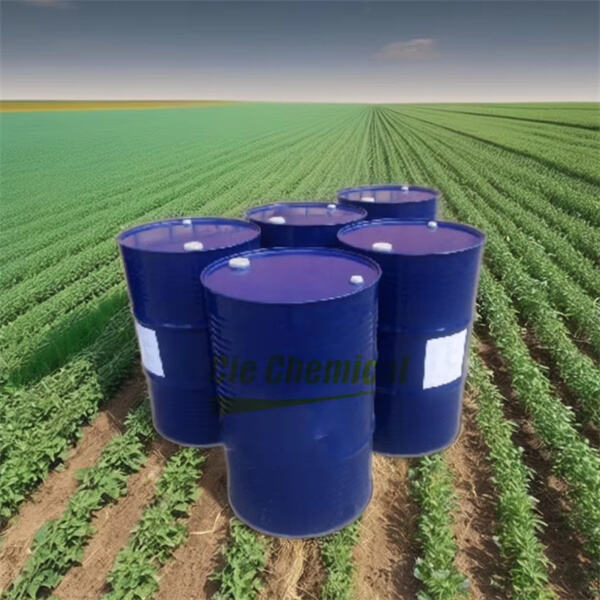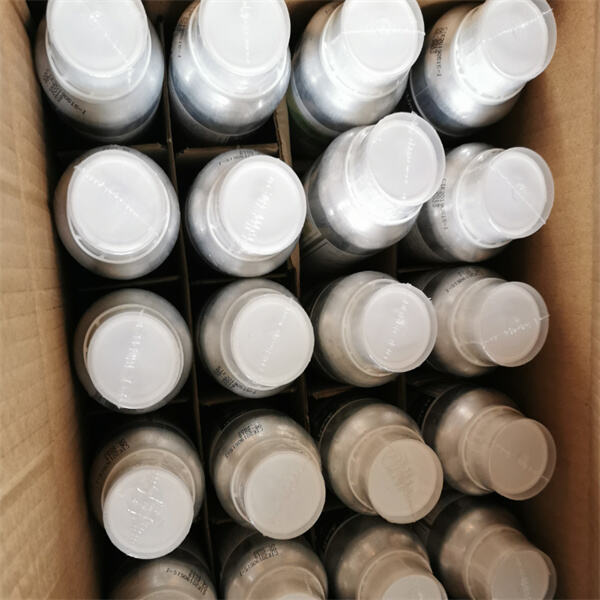Les mauvaises herbes peuvent représenter un grand défi pour les agriculteurs. Elles poussent littéralement sur vos cultures, absorbant les nutriments et la lumière solaire qui iraient sinon aux beautés voraces qui récoltent le blé. Les mauvaises herbes poussent trop abondamment, ce qui, en raison de la propagation rapide de la culture cible, entraîne des cultures moins saines et plus petites dans la plupart des cas. Cela peut amener les agriculteurs à obtenir une récolte réduite — la nourriture qu'ils peuvent vendre. Pour résoudre ce problème, les agriculteurs mettent en œuvre diverses méthodes pour gérer les mauvaises herbes et les empêcher de dominer leurs terres. Il existe différentes façons d'éliminer ces nuisibles, mais l'une des méthodes les plus populaires choisies par de nombreux agriculteurs consiste à appliquer un type spécifique de produit chimique appelé herbicide.
Les agriculteurs pulvérisent plus de 11 millions de livres d'acétochlory, un herbicide courant. Ils appliquent ce produit chimique sur les champs où poussent leurs cultures. En éliminant les mauvaises herbes qui concurrencent les cultures, l'acétochlory supprime cette concurrence. Il empêche la croissance des mauvaises herbes, ce qui permet une meilleure croissance des cultures sans que les mauvaises herbes ne les dominent. Les agriculteurs obtiendront ainsi des cultures plus saines et davantage de nourriture pourra être produite.
Les herbicides à base d'acétochlor sont extrêmement bénéfiques pour les agriculteurs car ils allègent leur travail. Cela permet aux agriculteurs de gagner du temps et de l'énergie qu'ils auraient passés à s'occuper des mauvaises herbes. Les agriculteurs d'autrefois arrachaient les mauvaises herbes manuellement avec des outils comme des houes et des pelles, avant l'utilisation des herbicides. C'était un travail pénible et fastidieux, prenant des heures. C'était une époque où les agriculteurs travaillaient des heures durant sous le soleil ardent, essayant de garder leurs champs exempts de mauvaises herbes.
Les herbicides comme l'acétochlor ont rendu plus facile pour les agriculteurs la gestion du problème des mauvaises herbes dans leurs champs. Avec cela, ils peuvent pulvériser l'herbicide dans leurs champs et ensuite passer à d'autres tâches importantes sur la ferme. Ils peuvent utiliser cette heure supplémentaire pour planter, arroser ou prendre soin de leurs plantes. De plus, les herbicides favorisent une meilleure croissance des cultures et peuvent ainsi fournir aux agriculteurs plus de nourriture à vendre sur les marchés. C'est très important pour leurs entreprises.

Il est vrai que cet incroyable acetochlor aide beaucoup les agriculteurs, mais en même temps, il pose certains problèmes pour l'environnement et la santé humaine. Parmi ses nombreuses préoccupations, l'une des plus importantes est la manière dont il affecte l'air, le sol et l'eau qui nous entourent. Cependant, ces ressources naturelles ont tendance à se contaminer avec les herbicides également. Par exemple, lorsque des cas d'herbicides sont lessivés dans les rivières et les cours d'eau pendant les pluies. Cela est nocif pour les poissons et autres animaux aquatiques, et menace également les terres qui serviront à faire pousser des cultures à l'avenir. Et si ces produits chimiques se mélangent à l'air, cela pourrait également compromettre la santé humaine.

Au cours des dernières saisons, de nombreuses informations nouvelles et passionnantes sont apparues concernant désherbants au glyphosate utiliser. À présent, des entreprises comme CIE Chemical font des efforts déterminés pour créer des herbicides améliorés et sûrs que les agriculteurs peuvent utiliser. Elles investissent des ressources pour trouver des solutions alternatives qui rendraient leurs produits encore plus efficaces. De plus, de nouvelles technologies visant à réduire les effets néfastes des herbicides sur l'environnement et la santé humaine sont également en développement.

Malgré ces efforts, les agriculteurs continuent de faire face à certains problèmes. Une préoccupation majeure est que certaines mauvaises herbes deviennent résistantes aux herbicides au fil des ans et ne sont pas facilement éliminées. Cela signifie que les agriculteurs pourraient se retrouver avec des "supermauvaises herbes" résistantes, extrêmement difficiles à gérer. Les agriculteurs doivent contrôler ce phénomène en utilisant différentes méthodes de lutte contre les mauvaises herbes. Ces options de diversification pourraient inclure le cultive de différentes variétés de cultures ou l'utilisation de traits tolérants aux herbicides et non tolérants.
1. Augmentation de la production : Les pesticides peuvent contrôler efficacement les ravageurs, les maladies et les mauvaises herbes, réduisant ainsi les niveaux de nuisibles, augmentant les rendements et assurant la sécurité alimentaire. 2. Économie de main-d'œuvre et de temps : L'utilisation de pesticides peut réduire les coûts en main-d'œuvre et en temps pour les agriculteurs, améliorant efficacement l'efficacité de la production agricole. 3. Garantie des bénéfices économiques : Les pesticides peuvent prévenir le SIDA, assurer les récoltes et apporter d'excellents bénéfices économiques dans la production agricole. 4. Assurer la sécurité et la qualité alimentaire : Les pesticides peuvent garantir la sécurité et la qualité des céréales et des aliments, éviter la survenue des épidémies et protéger la santé des populations.
Dans le monde de la CIE, vous trouverez une excellente fabrication d'agrochimiques et des services techniques, car nous nous concentrons sur les produits chimiques et la recherche de nouveaux produits pour les populations du monde. Au début du 21ème siècle, notre usine se concentrait uniquement sur les marques nationales. Après plusieurs années de développement, nous avons commencé à explorer les marchés internationaux, tels que l'Argentine, le Brésil, le Suriname, le Paraguay, le Pérou, l'Afrique, l'Asie du Sud, etc. En 2024, nous avons établi des relations commerciales avec des partenaires de plus de 39 pays. En même temps, nous serons déterminés à apporter davantage de bons produits dans encore plus de pays.
Shanghai CIE Chemical Co.,ltd. a été fondée le 28 novembre 2013. CIE se concentre sur les exportations de produits chimiques depuis environ 30 ans. En même temps, nous serons dévoués à apporter plus de bons produits dans plus de pays. De plus, notre usine a une capacité annuelle de production de glyphosate d'environ 100 000 tonnes et d'acétochlor d'environ 5 000 tonnes. De plus, nous collaborons également avec certaines entreprises multinationales pour produire du paraquat et de l'imidaclopride. Par conséquent, notre qualité est de classe mondiale. Actuellement, les formes galéniques que nous pouvons produire incluent SL, SC, OSC, OD, EC, EW, ULV, WDG, WSG, SG, G, etc. En même temps, notre département R&D s'engage toujours dans le développement de nouvelles formules pour produire certains produits chimiques mélangés selon les besoins du marché. De cette manière, l'efficacité de nos nouveaux produits peut répondre aux besoins des consommateurs finaux dans le monde entier. Nous considérons toujours cela comme notre responsabilité. De plus, jusqu'à présent, nous avons soutenu l'enregistrement de plus de 200 entreprises dans 30 pays dans le monde. En même temps, nous effectuons des rapports GLP pour certains produits.
Les produits pesticides que nous vendons sont conformes aux réglementations et normes nationales en vigueur. Nous assurons la fiabilité et la stabilité de la qualité des produits. 1. Conseil prévente : Nous offrons aux clients un service de conseil professionnel avant-vente pour répondre à leurs questions concernant l'utilisation, la dose, le stockage et d'autres problèmes relatifs aux vêtements et aux médicaments. Les clients peuvent obtenir notre aide par téléphone, e-mail ou consultation en ligne avant l'achat. 2. Formation après-vente : Nous organisons régulièrement des formations sur l'utilisation des pesticides, y compris leur utilisation correcte, les précautions à prendre, les mesures de protection, etc., afin d'améliorer les compétences et la sensibilisation des clients en matière d'utilisation des pesticides. 1/3 3. Visites après-vente : Nous effectuons des visites après-vente régulières auprès de nos clients pour comprendre leur utilisation et leur satisfaction, recueillir leurs avis et suggestions, et améliorer continuellement nos services.